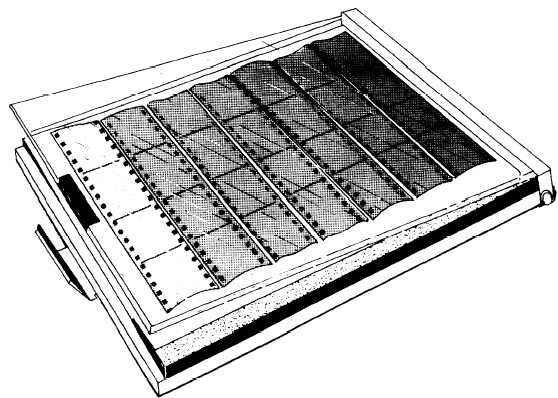Figure 11-1.–Proof printer.
303.46
or bleaching of the photographic image. Underfixation
causes the image to darken with time.
WARNING
Never dump fixer down the drain. Dispose
of all chemicals according to the local
instructions of your imaging facility.
In this chapter, the procedures and techniques for
producing black-and-white positive paper prints from
black-and-white negatives are discussed. Keep in mind
that the procedures and techniques provided are the
basics for printing color negatives and positives to
produce color prints as well as making duplicate
black-and-white film positives.
CONTACT PRINTING
A contact print is produced when you expose a sheet
of photographic printing paper through a negative with
the paper emulsion and the emulsion side of the negative
in contact with each other. Light is directed through the
negative which controls the amount of light transmitted
to the paper. The dense areas of the negative pass less
light than do the more clear or less dense areas. The
image densities formed (after development) in the
emulsion of the paper make a positive print that
represents the tonal values of the original subject. Since
the paper is in direct contact with the negative, the print
produced is exactly the same image size as the negative.
When you are making a print from a negative by this
method, only a 1:1 ratio is obtainable, but contact
printing is generally a more rapid means of making
prints than enlarging.
The quality of contact prints usually surpasses that
of enlargements because there is no scattering of the
image-forming light; however, with the ever-increasing
use of small film format sizes and since only same-size
prints can be made by contacting, enlarging has, for the
most part, replaced contact printing in the Navy except
for making proof prints.
CONTACT PRINTERS
Contact printing is the quickest, simplest, and most
economical method of producing photographic prints.
For making proof prints and small volume printing, all
a “contact printer” needs is a sheet of glass, a light
11-2


